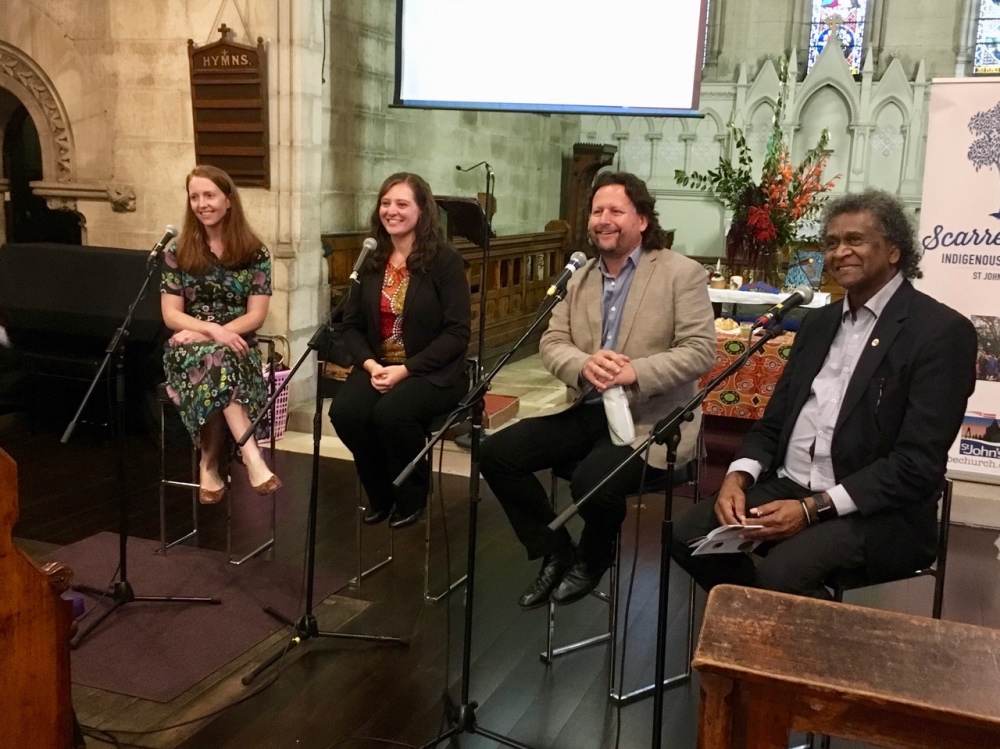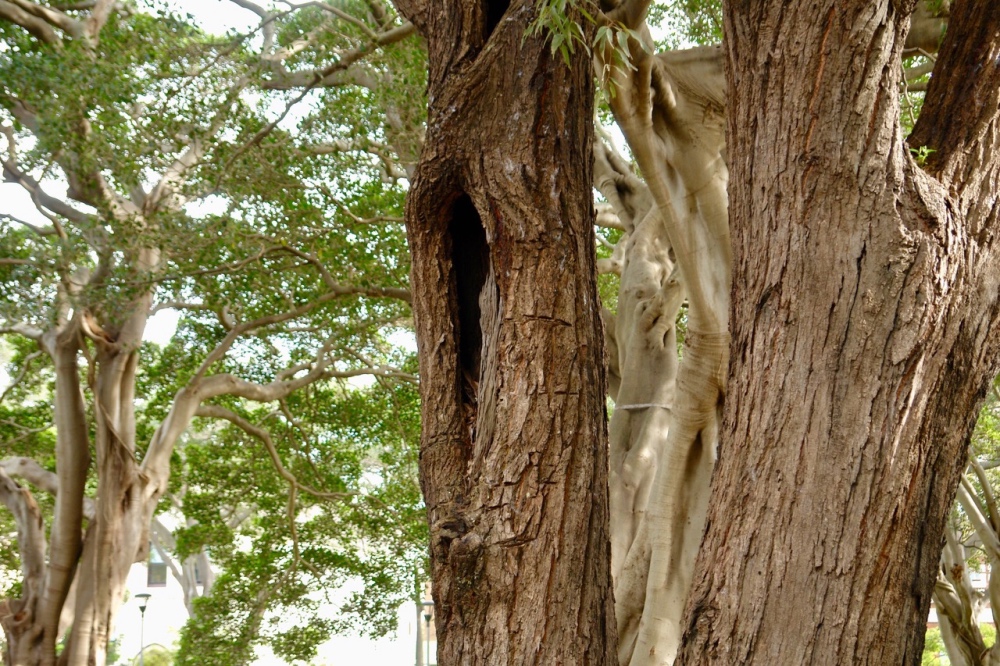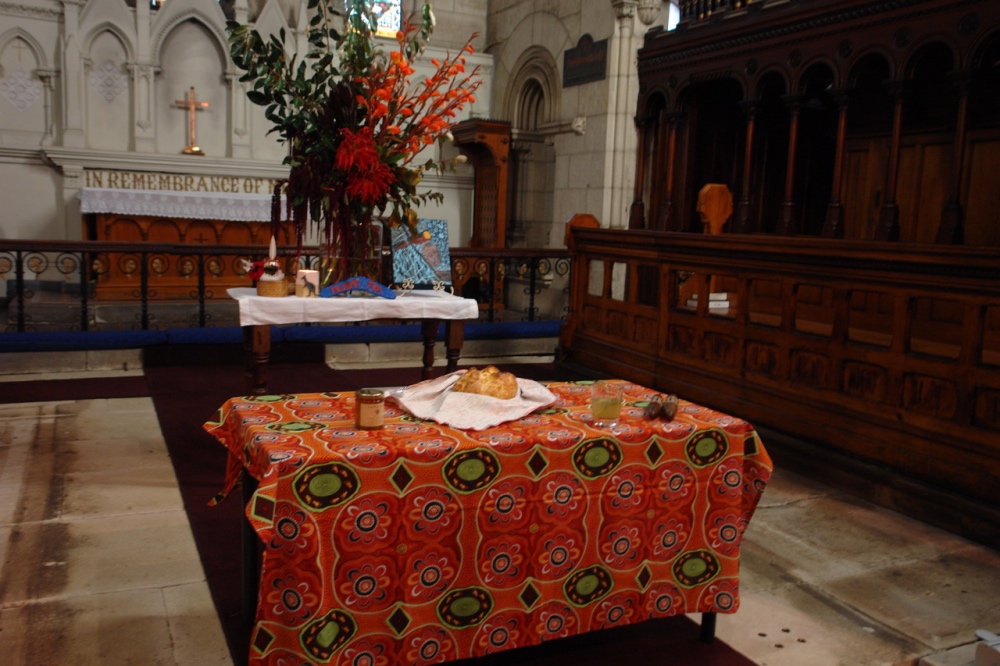
CHRISTOPHER GILBERT reports from a conference on ‘Christianity and Treaty’ held in Sydney last weekend…
Sydney, Australia
In the grounds of St John’s Anglican Church in the inner city suburb of Glebe, stands a tree considered the oldest in the region now called Sydney. Pastor Ray Minniecon, an Aboriginal pastor with roots in the Kabi Kabi and Gurang Gurang peoples of Queensland, was quick to point it out to visitors arriving at St Johns for the Scarred Tree Ministries‘ conference on “Christianity and Treaty” last Saturday (4th May).
The Turpentine-Ironbark bears a centuries old scar where a Gadigal person removed its bark, which Minniecon said was probably for a coolamon (platter) to carry bush tucker. Immigrants and Australian-born descendants of colonists could easily miss the scarred tree’s significance.

The Turpentine-Ironbark tree in the grounds of St John’s Anglican Church in Glebe. PICTURE: Christopher Gilbert.
But Minniecon explained its meaning in a spirit of hospitality that would rule the frank reflections delivered during the day as more than 125 people gathered for the conference. From Aboriginal and non-Indigenous Christian vantage points, speakers and conversations explored why only the Aboriginal and non-Indigenous church in unity could bring Australians to treaty as the solution to the tragic history between the two groups.
“I do not live in the past but the past lives in me,” Minniecon said as he opened the conference. His words came from a Nazi Holocaust survivor. He explained his own dilemma as an Aboriginal Christian, wanting to move forward but often resonating too much with chapter one of the prophet Habakkuk:
“I do not live in the past but the past lives in me,”
– Pastor Ray Minniecon.
“O LORD, how long shall I cry for help,
and you will not hear?
Or cry to you ‘Violence!’
and you will not save?
Why do you make me see iniquity,
and why do you idly look at wrong?
Destruction and violence are before me;
strife and contention arise.
So the law is paralysed,
and justice never goes forth.
For the wicked surround the righteous;
so justice goes forth perverted.”
Minniecon cited early colonists from their recorded observations of Aboriginal life, bringing to light a difficult realisation of Australian history: That colonists stole the land from its original inhabitants with ever-increasing violence, and that the theft was “justified” with legal fictions in the name of crown sovereignty, through the doctrines of “discovery,” and “terra nullius” (“nobody’s land”). Highly regarded colonial authorities like Rev Samuel Marsden and the Sydney Herald in the early 1800’s, Minniecon explained, reinforced these legal sophistries and licensed the eradication of native people by describing his people as Marsden did – “the most degraded of the human race.”
It would take the Mabo decision of the High Court of Australia in 1992 to nullify the “nullius” and replace it with a fulsome definition of Aboriginal sovereignty: “that the Meriam people are entitled as against the whole world to possession, occupation, use and enjoyment of the lands of the Murray Islands”. This sovereignty, Minniecon said, needs extending by treaty to all the descendants of the Aboriginal nations.
Minniecon pointed to the church’s familiarity with “treaty”, through its simile, “covenant”.
“The Bible provides us the best road map for treaty, through a covenant of blood,” he said. “It doesn’t get any better than that.”
Minniecon noted the humility required to enact such a covenant: non-Indigenous Christians discovering themselves as guests in relation to Aboriginal people as the true hosts of the land now called Australia.
And he asked, “Is there someone in the Anglican Church who will help us destroy the curse of Marsden so we can be seen to be made in the image of God too?”

The panel at the Scarred Tree Ministries conference on “Christianity and Treaty” – from left: Dr Kate Harrison Brennan, CEO of ADM, Ms Brooke Pentis, Rev Dr Geoff Broughton, and Pastor Ray Minniecon. PICTURE: Christopher Gilbert.
The conference’s next speaker, Dr Kate Harrison Brennan, the CEO of ADM (Anglican Deaconess Ministries), recognised the call for humility by admitting, “Engaging in this conversation, I realised I don’t have a theology for the land in which I now live. But I am learning.”
She told the audience of seeing the wonder in her two-year-old son as he watched foraging lorikeets when taken to a park in Wollstonecraft. It reminded her of a childhood awareness of landscape, sky, water, plants, and animals – experiences with vivid meanings. It’s an enchantment that seems to get deadened in the adult experience of the secular west, but is nurtured throughout Aboriginal community life. Constant relocation, she suggested, contributes to that loss of reverence for place.
”The fact that we [western Christians] don’t have a theology of the land is a perversion of the Christian tradition,” Harrison Brennan said, admitting her own frequent changes of address. “Owning our disconnection from the tradition is critical.”
Harrison Brennan challenged the audience to consider the modern abstraction of a unified sovereignty that subjugates all other peoples, and the challenge to the modern concept “from within” – from the Christian tradition itself. Her experience as a law student in Katherine, in the Northern Territory, exposed her to the practical reality of plural criminal jurisdictions at work. Federal government means a plurality of sovereignties. And the New Zealand experience, through the Treaty of Waitangi, also demonstrates that plurality of sovereignty works in our democracies.
“Without the riches of the Christian tradition, calls for treaty can only mean a trading of losses, or graded authority. We have an opportunity for Christians in Australia to offer a better apologetic – to testify to ‘the ultimate’ of Christ, by advocating for the institution of good order in charitable self-giving of authority.”
– Dr Kate Harrison Brennan, the CEO of ADM (Anglican Deaconess Ministries).
“Without the riches of the Christian tradition, calls for treaty can only mean a trading of losses, or graded authority,” she said. “We have an opportunity for Christians in Australia to offer a better apologetic – to testify to ‘the ultimate’ of Christ, by advocating for the institution of good order in charitable self-giving of authority.”
She proposed a plurality of guardianship and authority, grounded in treaties with Aboriginal nations.
Rev Dr Geoff Broughton, rector of Paddington Anglican Church and senior lecturer in practical theology at Charles Sturt University, continued the discussion on how this could occur by laying out the two theological conditions necessary for a genuine peace between Aboriginal and non-Aboriginal Australians: First, the humility of Jesus: “who, though He was in the form of God, did not count equality with God a thing to be grasped, but emptied Himself, by taking the form of a servant…” (Philippians 2:5-11), and second, in joining Aboriginal people in a lament for the land in the format of Lamentations 5:1-5:
“Remember, O LORD, what has befallen us;
look, and see our disgrace!
Our inheritance has been turned over to strangers,
our homes to foreigners.
We have become orphans, fatherless;
our mothers are like widows.”
Here Broughton said we are called to face history and listen to those who are grief stricken and despairing.
“The silent, solitary, scarred tree bears witness to the landlessness of the Gadigal people,” he said.
Explaining his own failures among Aboriginal people as a former minister in St John’s Anglican Glebe, he admitted he’d been reversing the God-given order. As a self-confident descendant of settlers, in hubris he played the host through many well-intentioned events, when the true hosts of this place, his Aboriginal brothers and sisters, owned that role.
Broughton like the other speakers pointed to the greatest obstacle to sustaining reconciliation between the First Nations peoples and non-Indigenous people of Australia: non-Indigenous resistance to honouring Aboriginal and Torres Strait Islander peoples in their role as the land’s hosts.

A table set up up by Brooke Prentis based on a dream she had which is described in a 2017 paper she co-authored with the Salvation Army’s Major Sandy Crowden ‘Learning to be Guests of Ancient Hosts on Ancient Lands’. PICTURE: Christopher Gilbert.
Concluding speaker, Ms Brooke Prentis from the Wakka Wakka people of south-east Queensland, an ADM Senior Fellow, Aboriginal spokesperson for the work of Common Grace, and coordinator of the Grasstree Gathering, cited the Salvation Army’s Major Sandy Crowden: “If as Australians we genuinely want to learn to be hospitable we must acknowledge that the European view of Aboriginal peoples and their culture was wrong. Then we must submit ourselves to be guests of ancient hosts on ancient lands.”
“Many are yearning for Australia to wake up and stay awake,” Prentis added, “to mature, where Aboriginal peoples and non-Indigenous peoples learn to walk together in Australia.”
“It’s not a foreign concept to draft a treaty,” she said. “The Australian government has negotiated over 2000 treaties internationally.”
Minniecon had pointed out that New Zealand’s Treaty of Waitangi has only six clauses in it. To overcome the unfounded fears of non-Indigenous peoples with regard to the idea of treaty, Prentis asked non-Indigenous peoples to reframe the conversation from the how and why of treaty, to the when of treaty. This is where she pointed to Jesus, the “great Un-Settler”, as being able to lead the church to such an outcome.
“We need non-Indigenous peoples to carry the burden with us of persuading and bringing up the issues. It doesn’t have to take another generation for Australians to make a lasting peace.”
– Brooke Prentis
To demonstrate Aboriginal readiness to walk with non-Indigenous peoples toward such a goal, she laid out a table with Aboriginal damper, native grasstree blossom cordial, and bush honey, which looked to the audience like a communion table, where all are invited to receive life from the ultimate host, Creator Spirit, through the invitation and provision of this land’s ancient hosts. Prentis left the question hanging, “Will the guests arrive?”
When an audience member asked to what extent Aboriginal peoples are willing to walk with non-Indigenous people towards such a treaty, Prentis responded that 73 per cent of Aboriginal and Torres Strait Islander peoples identify as Christian.
She said, “This means we have the mutual consideration of the love of and trust in Jesus Christ”.
And while Aboriginal Christian leaders carry much pain from even contemporary experiences with non-Indigenous churches and Christian organisations, Prentis said the same leaders continue to extend the hand of friendship and welcome non-Indigenous Christian participation in the fulfilment of treaty.
When asked how Christians might begin this mutual journey, the panel of speakers were unanimous. Follow Jesus the great “Un-Settler” – to use Prentis’ wording. Challenge the idea that the status quo is normal and acceptable. Become informed. Write to your denominational leaders. Conduct information events at your church. If the invitation is there – what is the basis for saying “no”?
“We need non-Indigenous peoples to carry the burden with us of persuading and bringing up the issues,” Prentis said. “It doesn’t have to take another generation for Australians to make a lasting peace.”
Correction: The caption on the third image was replaced to more accurately reflect what the picture represents.





